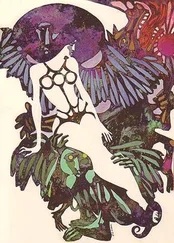“The only thinkers to be thought of are the dead Teilhard de Chardin and the stillborn Sartre, Zielinski, Aichinger. Oh well, if you’re going to laugh there’s no use going on.”
“All of us here are experts on something,” Cogsworth said. “Most of us are experts on everything. We know the world as it is. Let us do what we are going to do and then look at the world.”
“Push the button, Epikt!” Gregory Smirnov ordered.
From his depths, Epiktistes the Ktistec machine sent out an Avatar, partly of mechanical and partly of ghostly construction. Along about sundown on the road from Pamplona to Roncesvalles, on August 14th of the year 778, the traitor Gano was taken up from the road and hanged on a carob tree, the only one in those groves of oak and beech. And all things thereafter were changed.
“Did it work, Epikt? Is it done?” Louis Lobachevski demanded. “I can’t see a change in anything.”
“The Avatar is back and reports his mission accomplished,” Epikt stated. “I can’t see any change in anything either.”
“Let’s look at the evidence,” Gregory said. The thirteen of them, the ten humans and the Ktistec, Chresmoeidec, and Proaisthematic machines, turned to the evidence and with mounting disappointment.
“There is not one word changed in the Hilarius text,” Gregory grumbled, and indeed the basic text still read:
The king Marsilies of Saragossa, playing a multiplex game, took money from the Caliph of Córdova for persuading Charlemagne to abandon the conquest of Spain (which Charlemagne had never considered and couldn’t have effected); took money from Charlemagne in recompense for the cities of the Northern marches being returned to Christian rule (though Marsilies himself had never ruled them); and took money from everyone as toll on the new trade passing through his city. Marsilies gave up nothing but thirty-three scholars, the same number of mules, and a few wagonloads of book-manuscripts from the old Hellenistic libraries. But a road over the mountains was opened between the two worlds; and also a sector of the Mediterranean coast became open to both. A limited opening was made between the two worlds, and a limited reanimation of civilization was effected in each.
“No, there is not one word of the text changed,” Gregory grumbled. “History followed its same course. How did our experiment fail? We tried, by a device that seems a little cloudy now, to shorten the gestation period for the new birth. It would not be shortened.”
“The town is in no way changed,” said Aloysius Shiplap. “It is still a fine large town with two dozen imposing towers of varicolored limestone and midland marble. It is a vital metropolis, and we all love it, but it is now as it was before.”
“There are still two dozen good shows in town that I haven’t seen,” Valery said happily as she examined the billings. “I was afraid that something might have happened to them.”
“There is no change at all in the Beautiful Arts as reflected in the reviews here that we have taken as basic texts,” said Audifax O’Hanlon. “You can say what you want to, but the arts have never been in finer shape.”
“It’s a link of sausage,” said the machine Chresmoeidy.
“‘Nor know the road who never ran it thrice,’” said the machine Proaisth. “That’s from an old verse; I forget the author; I have it filed in my main mind in England if you’re interested.”
“Oh yes, it’s the three-cornered tale that ends where it begins,” said the machine Epiktistes. “But it is good sausage, and we should enjoy it; many ages have not even this much.”
“What are you fellows babbling about?” Audifax asked without really wanting to know. “The art of painting is still almost incandescent in its bloom. The schools are like clustered galaxies, and half the people are doing some of this work for pleasure. Scandinavian and Maori sculpture are hard put to maintain their dominance in the field where almost everything is extraordinary. The impassioned-comic has released music from most of its bonds. Since speculative mathematics and psychology have joined the popular performing arts, there is considerably more sheer fun in life.
“There’s a piece here on Pete Teilhard putting him into context as a talented science fiction writer with a talent for outré burlesque. The Brainworld Motif was overworked when he tackled it, but what a shaggy comic extravaganza he did make of it! And there’s Muldoom, Zielinski, Popper, Gander, Aichinger, Whitecrow, Hornwhanger—we owe so much to the juice of the cultists! In the main line there are whole congeries and continents of great novels and novelists.
“An ever popular art, graffiti on mingitorio walls, maintains its excellence. Travel Unlimited offers a ninety-nine-day art tour of the world keyed to the viewing of the exquisite and hilarious miniatures on the walls of its own restrooms. Ah, what a copious world we live in!”
“It’s more grass than we can graze,” said Willy McGilly. “The very bulk of achievement is stupefying. Ah, I wonder if there is subtle revenge in my choice of words. The experiment, of course, was a failure, and I’m glad. I like a full world.”
“We will not call the experiment a failure since we have covered only a third of it,” said Gregory. “Tomorrow we will make our second attempt on the past. And, if there is a present left to us after that, we will make a third attempt the following day.”
“Shove it, good people, shove it,” the machine Epiktistes said. “We will meet here again tomorrow. Now you to your pleasures, and we to ours.”
The people talked that evening away from the machines where they could make foolish conjectures without being laughed at.
“Let’s pull a random card out of the pack and go with it,” said Louis Lobachevski. “Let’s take a purely intellectual crux of a little later date and see if the changing of it will change the world.”
“I suggest Ockham,” said Johnny Konduly.
“Why?” Valery demanded. “He was the last and least of the medieval schoolmen. How could anything he did or did not do affect anything?”
“Oh no, he held the razor to the jugular,” Gregory said. “He’d have severed the vein if the razor hadn’t been snatched from his hand. There is something amiss here, though. It is as though I remembered when things were not so stark with Ockham, as though, in some variant, Ockham’s Terminalism did not mean what we know that it did mean.”
“Sure, let’s cut the jugular,” said Willy. “Let’s find out the logical termination of Terminalism and see just how deep Ockham’s razor can cut.”
“We’ll do it,” said Gregory. “Our world has become something of a fat slob; it cloys; it has bothered me all evening. We will find whether purely intellectual attitudes are of actual effect. We’ll leave the details to Epikt, but I believe the turning point was in the year 1323 when John Lutterell came from Oxford to Avignon where the Holy See was then situated. He brought with him fifty-six propositions taken from Ockham’s Commentary on the Sentences, and he proposed their condemnation. They were not condemned outright, but Ockham was whipped soundly in that first assault, and he never recovered. Lutterell proved that Ockham’s nihilism was a bunch of nothing. And the Ockham thing did die away, echoing dimly through the little German courts where Ockham traveled peddling his wares, but he no longer peddled them in the main markets. Yet his viewpoint could have sunk the world if, indeed, intellectual attitudes are of actual effect.”
“We wouldn’t have liked Lutterell,” said Aloysius. “He was humorless and he had no fire in him, and he was always right. And we would have liked Ockham. He was charming, and he was wrong, and perhaps we will destroy the world yet. There’s a chance that we will get our reaction if we allow Ockham free hand. China was frozen for thousands of years by an intellectual attitude, one not nearly so unsettling as Ockham’s. India is hypnotized into a queer stasis which calls itself revolutionary and which does not move—hypnotized by an intellectual attitude. But there was never such an attitude as Ockham’s.”
Читать дальше




![Рафаэль Лафферти - Дни, полные любви и смерти. Лучшее [сборник litres]](/books/385123/rafael-lafferti-dni-polnye-lyubvi-i-smerti-luchshe-thumb.webp)
![Рафаэль Лафферти - Лучшее [Сборник фантастических рассказов]](/books/401500/rafael-lafferti-luchshee-sbornik-fantasticheskih-ra-thumb.webp)